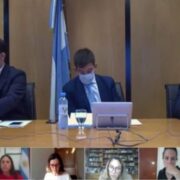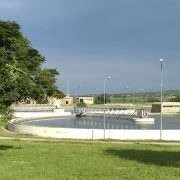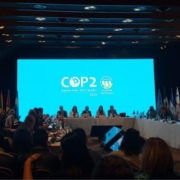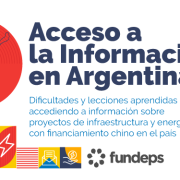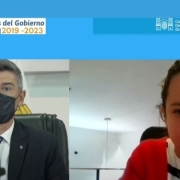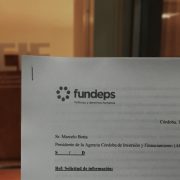Right to Access to Information Day
Every September 28 we celebrate the International Day of Access to Public Information in order to promote government transparency and raise awareness among citizens in the exercise of this human right. This day has been held since 2002, following a conference held in Bulgaria, organized by defenders of freedom of information from 15 countries. Years later, in 2015, the United Nations Educational, Scientific and Cultural Organization (UNESCO) proclaimed the celebration of this date in order to consolidate public awareness about the importance of access to information.
“Below, we offer a google translate version of the original article in Spanish. This translation may not be accurate but serves as a general presentation of the article. For more accurate information, please switch to the Spanish version of the website. In addition, feel free to directly contact in English the person mentioned at the bottom of this article with regards to this topic”.
The Right of Access to Public Information (DAIP) is a fundamental right that every person has to request and receive information that is in the possession of the State. In return, it is an inescapable duty of the public powers to implement and ensure compliance with the objective of making public management transparent. In its collective dimension, the DAIP acquires relevance for the strengthening of democracy since it functions as a mechanism to guarantee accountability and citizen control. In turn, it is a key right that enables and enhances the enjoyment of other human rights, such as health, a healthy environment, education, among others.
Access to information held by public entities can be guaranteed in two ways. Through active transparency, that is, when the State proactively publishes information or through a request for public information before a specific body, which is known as passive transparency.
Access to information in the province of Córdoba
In November 2019, and with the support of 14 organizations throughout the country, we launched the report “Córdoba: a proposal to update the law on access to public information” where, at the same time, highlighting the main international standards on the matter , we make specific recommendations so that Córdoba updates its law No. 8803 on Access to Knowledge of State Acts dating from 1999. From that moment to date, nothing has changed, so the update claim is still in force, let’s see what they are the main shortcomings of the law:
- It is a law of 10 articles that, for the most part, is limited to establishing the procedure to access public information and fails to regulate the right of access to information in a comprehensive manner, so as to ensure its effective compliance.
- It does not enunciate, beyond the principle of “publicity of government acts”, other key principles in order to guarantee the right of access to public information to any person.
- It defines “public information” in a very limited way as “any type of documentation that serves as the basis for an administrative act or the minutes of official meetings.” In general, “document” refers to a written medium. That is why this definition is extremely restrictive and defines, ultimately, what citizens will or will not have access to. It is advisable that a broader definition of public information be followed as the national law does.
- It contains a limited number of subjects obliged to provide information: it does not contain entities that receive public funds (such as political parties or unions) or are contractors of the State to provide a public service; and as for the Judicial Power, it restricts it to its administrative activity.
- It does not provide for active transparency, so the type of information that it publishes is at the discretion of the provincial government without being subject to any type of control or minimum floor of information to be published.
- It does not foresee measures for the promotion, implementation and assurance of the right, as is the case of the existence of an Access to Public Information Agency.
Access to public information is essential for the exercise of its function and the achievement of its objectives, since it constitutes a first element of analysis to be able to monitor public policies and collaborate accordingly.
In 2019, of more than 100 AIP requests made between the municipality and the province of Córdoba, only 10 were answered. There is also a practice that violates the principle of publicity and the strengthening of the institutions of democracy; This is to respond to requests for information, once they are prosecuted.
As an example we can cite the case “Foundation for the Development of Sustainable Policies c / Secretariat of Financial Administration of the Ministry of Finance of the Government of the Province of Cba. – Amparo Por Mora (Law 8,803) – Appeal for Cassation ”, in which, after 10 years we obtained in 2019 a favorable ruling from the Superior Court of Justice of Córdoba on budgetary information required in 2010 from the provincial and municipal governments regarding to the registry of suppliers and to the funds of direct execution in the hands of Ministers. Likewise, and without yet having a final judgment, in August 2019 we filed an amparo action against the provincial Ministry of Health for not responding to a request for information on health services in the area of sexual and reproductive health in the province of Cordoba.
What happened this pandemic year?
The outbreak of the pandemic highlighted and exacerbated the difficulties that already existed and hindered the full exercise of the right of access to public information.
As is known, at the beginning of the pandemic and together with the mandatory social isolation measures, the “suspension of administrative terms” was ordered at all levels of government, both national, provincial and municipal, which implied a “stop” in the normal functioning of the entire public administration. In this area, it is worth highlighting a good practice on the part of the National Agency for Access to Public Information, which on April 14 of this year ordered through resolution 70/2020 to exempt itself from the general suspension of administrative deadlines so that all the procedures derived from both the national law on access to public information and the law on the protection of personal data, will be active. One of the fundamentals he used was the following “in the face of an emergency situation and a health crisis resulting from the pandemic generated by COVID 19, accessing public information is essential to know the Administration’s performance and avoid arbitrariness in taking of public decisions ”. We highlight this decision, which enabled Fundeps to make a total of 24 requests for public information at the national level, having already obtained 17 responses, which allows us to continue monitoring some key public policies on human rights.
Although at the provincial and municipal level, and in part due to the lack of active and interactive AIP Agencies with society and / or publicity of information related to AIP requests since the beginning of the pandemic, it was not possible to establish exactly when is that the AIP deadlines and mechanism were resumed.
At the municipal level, and given the new government management, the information request website has been updated, available here. For its part, the province forged by the emergency situation and social distancing that made it impossible to manage AIP requests in the only way that they were foreseen, that is to say in person, has settled a historical debt which has been the creation of a site of online inquiries to make requests for public information. Although we celebrate this progress, which is key in this period and which will facilitate the management of requests once it has ended, we consider that the requirement to have a Digital Citizen to be able to make a request for public information is excessive in terms of human rights. Although it may be desirable for the province for the entire population to manage its Digital Citizen, the right of access to public information cannot be subject to a formal and technological requirement such as this one. This is absolutely contrary to both the standards that guide this right and current legislation.
The Inter-American Model Law on Access to Public Information establishes that any person must access public information even anonymously, only having to provide a contact information in order to obtain the required information. Argentina, at the time of enacting Law 22,175 on access to public information in 2016, indicated that the requesting person must indicate their identity, the information requested and a contact information. Similarly, it is foreseen in Córdoba, in Article 6 of Law No. 8,803 where it is established that “the request for information must be made (…) with the identification of the applicant, without being subject to any other formality”. Therefore, the requirement of having a Digital Citizen is clearly an obstacle in the exercise of this human right.
In this context, some claims are still in force and are being deepened in order to effectively exercise the right of access to public information, such as the updating of Law No. 8,803 on “access to knowledge of the acts of the State” of Córdoba that dates from 1999, that special emphasis be placed on the obligation of active transparency by the States, having to publish complete and current information in open formats, as well as the creation of an Access to Public Information Agency at the provincial level that guarantees the full validity of this right.
Contact
Nina Sibilla, ninasibilla@fundeps.org


